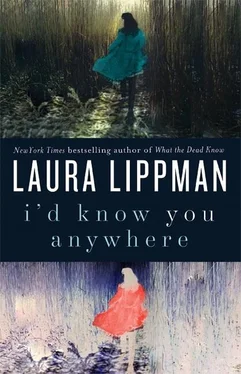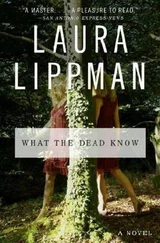She drifted over to the computer, entered the name “Barbara LaFortuny.” For an activist, she was suspiciously inactive, leaving few traces of herself in the public sphere, although there was a Baltimore Beacon-Light profile available only in abstract; she would have to pay to read the entire article. She wasn’t that interested, and it was a relief to discover how low her threshold was: She wouldn’t pay $3.95 to find out more about Barbara LaFortuny. But her fingers continued to wander, plugging the name into the images file and recoiling at the one photo that showed up: a woman with three-quarters of her face swathed in bandages. Amazing, the power of an image compared with words. Peter had stood here not five minutes ago and explained that this woman, Walter’s champion, had been a victim of a knife attack. But the horror hadn’t truly registered.
This was why Eliza seldom spoke of the rape. Words could not convey what Walter had done to her, the depth of the betrayal, more brutal than the act itself. And there was no photo, no image, to show the damage he had inflicted. Eliza was not inclined to be competitive about suffering; after all, there were at least two dead girls always at the ready, eager to inform her that she was, in fact, the lucky one, and a whole cadre of possible victims behind them. But she couldn’t help feeling a little superior to Barbara LaFortuny. Just a little. A line from a poem came to her, something about the people who never got suffering wrong. Yet in Eliza’s experience, everyone, even most victims, got suffering wrong. That’s why it was better never to speak of it.
1985
THEY DROVE. IF THERE WASa purpose, a destination, Elizabeth could not pinpoint it. They had dipped down into Virginia, this much was clear from the highway signs, and they sometimes crossed the Shenandoahs into West Virginia. Walter found odd jobs to make cash—chopping wood, for example, to help people with vacation homes prepare for the winter ahead, which Walter said would be a bad one, as bad as last winter, which had seen one of the worst snowstorms in the area’s history. “I feel it in my bones,” he said, and he was being literal. He chopped wood, he did yard work, he fixed things. Elizabeth was surprised by the ease with which he found work, how people looked past her, never questioning why she was with Walter and, after Labor Day passed, not in school. Perhaps they thought she was simpleminded, as simple as Lennie in Of Mice and Men . She seldom spoke. Walter had made it clear that she should answer only direct questions with as few words as possible. And although Walter had purchased clothing for her—two pairs of jeans, some T-shirts, a sweater, all from JCPenney—she always looked a little dingy because she had to wear each outfit three to four times before they could go to a coin laundry. It was one of the few times he left her alone. He would have her strip down behind a sheet, whether at a motor court or a campsite, then hand him her clothes. He tied her hands, but not her feet, and although he gagged her the first few times, he didn’t even bother with that after a while.
She could, of course, have left the room or the tent, wrapped in nothing but a sheet. Her feet were free. She could have called for help when he stopped gagging her. But it was too embarrassing. She could not get past imagining those first few minutes, when she would be the girl in the sheet, when people would point and laugh and maybe worse. There was the very fact of the… un-loveliness of her body, the potbelly, which was more pronounced from their fast-food, on-the-go diet. She could not imagine walking around in a sheet, worrying about what might be glimpsed, or how it might come untied.
The real problem was that she couldn’t imagine escaping at all. He would kill her. Kill her family. She dreamed of rescue, hoped for it, prayed, but she believed it would have to be something that happened to her, not because of her.
SOMETIMES SHE WOULD TRYto pinpoint where she would be, back home, at a particular time of day. At, say, 10:15 A.M., she would picture the mind-numbing lull of late morning in school, those early periods when the day’s promise has already burned off, but the end still seems impossibly distant. At 4 P.M., she would see herself lying on the sofa, watching television while doing her homework, the height of her rebelliousness. Her parents always said they didn’t mind if she watched television before or after homework, only never during. But there would be no one to rat her out, since Vonnie had gone to college. Only—had Vonnie left for college, after Elizabeth disappeared? Probably. Elizabeth hoped she had. A disappointed Vonnie was a terrible, terrible thing. Vonnie seemed to believe that she should always get what she wanted, more so than other people. The drama around her college applications had been intense, affecting the entire household. They all knew better than to fetch the mail during those weeks when acceptances—and, in one memorable case, an actual rejection, from Duke—started arriving, but Elizabeth might sneak a peek into the mailbox if she got home before Vonnie. She examined the envelopes, knowing that it was all about fat versus thin, daydreamed about the day when her own letters would be waiting for her. But she didn’t dare take the mail in, and even her parents ceded that privilege to Vonnie.
In the truck, driving the mind-numbingly familiar roads, Walter said: “Tell me a story. Tell me about that man and his dog.”
She did. The problem was—she hadn’t actually read Travels with Charley . She had started it but found it dull, not at all the work she was expecting after reading Of Mice and Men and Cannery Row . But she was scared to admit that she had lied—Walter prized honesty above all other values and had made it clear that she must always tell him the truth—so she made it up as she went along, trying to figure out what kind of stories Steinbeck and his poodle would have lived on the road. She borrowed heavily from a book her father had read the summer before last, Blue Highways, which had inspired her parents to take them on back-road drives in Maryland, Pennsylvania, and Virginia. God, it had been boring. Sometimes, roaming with Walter, she would glimpse a place, a town, a gas station that she thought she recognized from those day trips, but she could never be sure.
“Tell me another story,” Walter repeated. It was a gray, indeterminate day, out of season. Too cool to be summer, which it still was on the calendar, but lacking the crispness of autumn. The air was muggy, as damp and unrewarding as a sponge bath.
“Well, there’s a time when they went to…Tulsa.”
“Tulsa? After Milwaukee?”
“I’m not telling it in order, just as I remember it.”
“Where did they start again?”
“New York.”
“And where do they end up?”
“I can’t tell you that. It gives too much away.” She couldn’t tell him, in part, because she was making it up as she went along, but also because she was scared to find out what happened should Mr. Steinbeck and his poodle ever stop moving. If they didn’t reach the end, Walter wouldn’t tire of her, dig a hole in some forest and leave her there.
“Okay. What happened in Tulsa?”
“They found a necklace, lying on the sidewalk. That is, Charley found it, while they were out on their walk. It had purple stones—”
“They call those amethysts.”
“Yes, I know.” She did know, but she hadn’t thought Walter would. He surprised her, sometimes, with the facts he had at his disposal. More surprising, though, were the things he didn’t know, common bits of everyday living that even little kids understood. “Amethysts, in an old-fashioned setting, big square gold frames, clearly an antique. But there was no one around and it was a block of funny old houses. It was hard to imagine that anyone living in those houses owned such a necklace. Charley lifted it from the sidewalk with his nose—”
Читать дальше












